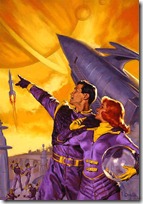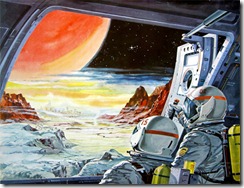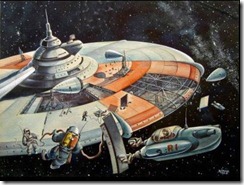 My love for everything SF started back when I was still in elementary school. For a while I had been admiring the silver hardcover books with those fancy covers that my father had on his bookshelf. I think I was about 7 or 8 years when I finally picked one up and starting reading.
My love for everything SF started back when I was still in elementary school. For a while I had been admiring the silver hardcover books with those fancy covers that my father had on his bookshelf. I think I was about 7 or 8 years when I finally picked one up and starting reading.
That book was the first issue of the hardcover edition of the Perry Rhodan series. When I remember correctly the first few pages described in much detail how a rocket was prepared for its launch towards the moon. This was much more exciting than everything I have been reading until then.
Since then I have read countless SF novels, short stories, watched almost every SF TV series and movie I could get my hands on and played quite a few SF computer games. And as you can imagine I was always trying to run or play in any SF roleplaying game. It’s probably no surprise that the first roleplaying game I ever bought was Marc Miller’s original Traveller.
But for some reason I played a lot more often in Fantasy or Horror games than I ever played in SF games. From time to time I just wonder why that’s the case. And when you have a closer look at our hobby you’ll notice that it’s totally dominated by Fantasy roleplaying games.
There’s of course the 800 lb. gorilla Dungeons & Dragons, forefather of all other roleplaying games. Without a doubt D&D and it’s cousin Pathfinder are now the flagships of Fantasy gaming. When it comes to horror games, there’s of course Call of Cthulhu and the more recent World of Darkness games that are pretty popular. But when it comes to flagship SF RPGs things are getting more complicated. Traveller might be close to being the flagship SF RPG, but compared to D&D the whole SF RPG hobby is just a small niche. Or do you think that anyone outside the hobby has ever heard about Traveller?
 But when you look at popular movies and TV shows you realize that Science Fiction is extremely popular. Most modern superhero movies are in fact SF movies, there are a lot of incredibly popular SF TV series (including Stargate which has been running for ages). Even when it comes to computer games SF is as popular as ever. Alas when it comes to roleplaying games no SF game has ever been a huge hit. Even games based on popular franchises like Star Wars (which is not really SF in my book, but I digress) or Star Trek are much less popular than fantasy or horror games. As far as I know no SF RPG was ever close to being as big as D&D.
But when you look at popular movies and TV shows you realize that Science Fiction is extremely popular. Most modern superhero movies are in fact SF movies, there are a lot of incredibly popular SF TV series (including Stargate which has been running for ages). Even when it comes to computer games SF is as popular as ever. Alas when it comes to roleplaying games no SF game has ever been a huge hit. Even games based on popular franchises like Star Wars (which is not really SF in my book, but I digress) or Star Trek are much less popular than fantasy or horror games. As far as I know no SF RPG was ever close to being as big as D&D.
Rob Donoghue has written an interesting blog post about that topic a while ago. As he pointed out there are basically two problems: a) the SF genre is extremely fragmented and b) there’s no flagship SF RPG. I definitely agree with his conclusions. In a way the strength of the SF genre, the fact that it’s extremely broad and diverse, is probably a major weakness when it comes to roleplaying games.
 Let’s face it, most roleplaying games rely a lot on clichés. And since the majority of fantasy RPGs are at least loosely based on Tolkien’s world, the common tropes of the genre are known to a lot of people. But in SF things are more complicated. Depending on your definition of SF everything from Steampunk over Hard Science Fiction to Star Wars might be counted as part of the genre. But the steampunk tropes definitely won’t fit into a SF game modeled after Niven’s Ringworld setting and vice versa.
Let’s face it, most roleplaying games rely a lot on clichés. And since the majority of fantasy RPGs are at least loosely based on Tolkien’s world, the common tropes of the genre are known to a lot of people. But in SF things are more complicated. Depending on your definition of SF everything from Steampunk over Hard Science Fiction to Star Wars might be counted as part of the genre. But the steampunk tropes definitely won’t fit into a SF game modeled after Niven’s Ringworld setting and vice versa.
But is this the only reason? Or are there other factors at work, too? One thing I’ve noticed as a GM is that a lot of players prefer to play games in “easier times”. Of course there’s nothing easy or romantic about living in a world without clean tap water, central heating and electric light, but a little romanticizing goes a long way. I believe for many players science fiction settings feel too much like the real world with technology, jobs, taxes etc.
What do you think are the reasons why there have never been any hugely successful SF RPGs? Or do you disagree with my theory completely? In any case I would love to read your comments on that matter.

I think you've hit on the most important points. Sci Fi is more difficult to run and play. There are often more rules too, because players want to play space battles and so on. You don't need those systems in Fantasy.
As for weapon lethality, there is no sword more horrendously powerful than this: https://picasaweb.google.com/brainwiped/IcarArt#5…
or this: https://picasaweb.google.com/brainwiped/icarart#5…
🙂
No fantasy game has ever come close to being as big as D&D either, not even close. It’s like asking why all the huge successes in black & white indy comics are parodies of superhero comics except starring funny animals? Teen-aged Mutant Ninja Turtles, like D&D, is sui generis, not a representative of a large class. If you define success as being at that level, there just aren’t any other examples. On the more modest terms that every RPG that isn’t D&D can possibly hope to achieve, Traveller and Champions were both quite successful. For that matter so is Call of Cthulhu…and unlike TSR, its publisher is still in business and coming out with new editions.
The biggest problem with sci-fi RPGs is they don't allow the seemingly kitchen sink approach that fantasy games often do. People walk into a sci-fi campaign with a lot more baggage where-in what they like has to be stripped away. A GM says" Sorry no mystic-space knights, no mutants, no cyborgs, no player operated FTL starships, no telepathic powers, no light sabers, no Klingons" and the player is left asking ..".I thought this was a sci-fi game?"
Not all fantasy games follow the kitchen sink approach either. Or have you ever seen someone playing Lizardmen in a Middle Earth game or elves in a Conan-based game. Not every fantasy game is that open. But I agree that most SF settings are much more specific than most fantasy worlds.
I disagree that Fantasy games include everything (kitchen sink). I would instead say that it is the whole fantasy genre that is far more limited in it’s scope and thus it’s strength. As an example take Mouseguard an excellent game but has a smaller market. It is essentially fantasy but many people would not immediately group it with Tolken fantasy or the classic fantasy realm because the story of Mouseguard is different than D&D (they probably could be made to connect but don’t immediately). If you look into “Fantasy” before D&D you have a very diverse world, after D&D the focus narrows greatly. What you essentially have is a genre defining work, so much so that most other media (tv, movies, games, music) now follow D&D’s model of Fantasy. Disney movies are an exception but are not classically thought of as “Fantasy”. Science Fiction RPG would have to have a similarly definitive work where everyone after it would say “me too”. Star Wars is almost that work for other media but the progression happened the other way around. The movies came out and then the RPG and I think that makes all the difference.
How do you change that? Make a Sci-Fi RPG that spawns books and movies and redefines the genre. Simple 😛
I assume we're talking other-worlds type of sci-fi as in space, far future, alternative histories, etc.? What about SLA Industries or Cyperpunk?
First, despite SF being (mostly) about the future, it's actually very tied to the time it's created or written in. While some SF is future proof, often it's not. New ideas about reality, about how the universe works, etc. supercede the old ideas and make them seem quaint and using them can seem a little "retro". So a lot of SF is "fashion" and gloss (last year all devices were black and next year they'll be white because then they'll look new).
And yes, SF is such a big scope that it's impossible to have a single SF game. That's the strength of SF fiction that it's a framework for all sorts of stories from adventure to hard sf to mind-bending. That's also what turns me off SF as an RPG unless it's tied down by other tropes or genres. SF can be anything, there are no rules about the world. You could meet yourself and then discover you're the clone, discover reality isn't real, that you're dead or a computer simulation. Also playing aliens is a daunting idea, because, well, they are alien. They don't think like us or they shouldn't. They aren't humans in rubber suits, how can true aliens be a PC? (Some of the best SF is about trying the understand the utterly alien).
And then there is audience buy-in. As you said Fantasy and Horror have familiar troupes to players. But because of SF's large grasp, there isn't a familiar set of troupes unless you nail it down to some specific troupes or mix it with another genre. And for me, if you set the setting so far in the future or far from humanity, I find it difficult to engage or connect to that material, because it's no longer about humans, at least to me. Maybe it's not the same for others.
Just my 2c
My recent post Fuck content- it’s how it’s presented that matters
My take – D&D has worked best because while it steals from the fantasy genre, it doesn't try to duplicate fantasy stories (or didn't back in the day). It was a wargame set in a dungeon, which is comparatively easy to run. Most other genres of RPG attempt to duplicate a story – plot, pacing, etc – which is much trickier. A sci-fi game that is designed, first and foremost, as a "rescue the space princess from the space lord's fortress" would probably work pretty well. In fact – maybe I'll go off and try to write one.
My recent post Yun-Bai-Du- City of the Clouds Part IV
I had a long response, so I decided to make it a blog post at http://bigballofnofun.blogspot.com/2011/06/sci-fi…
What about shadowrun? I know it blends fantasy too, but the overall themes and mood are pretty heavily SF.